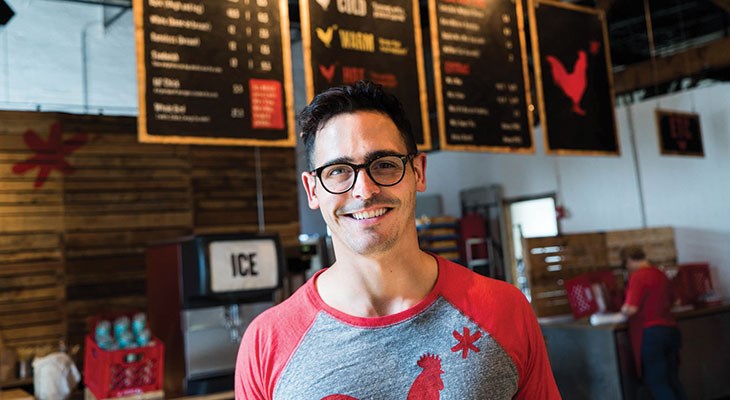Five-year-old Hot Chicken Takeover is a resounding success story for Central Ohio, with plans to open its first out-of-market restaurant in Cleveland this summer. But like any young business, its journey has had growing pains.
In one gut-check moment, founder Joe DeLoss realized the company wasn’t going to make payroll, despite active cash flow management. He and his wife scrounged for 0 percent interest credit card offers and drummed up some funds, but were still short.
“I called my dad and I said, ‘Dad, I’m in a bind. I’m not going to make payroll. I think I know what’s happened. I need $5,000,’” DeLoss says. Forty-five minutes later, his dad wired the money.
The surprising cash shortfall came after the company’s first investment round, he says.
“Come to find out, we had changed bank accounts and never sent the credit card processor a new bank account to direct deposit money,” DeLoss recalls. “So, we were missing $40,000 of receivables and I didn’t have an accounting system at that point to call that out.
DeLoss shared this story and others during a February fireside-style chat at Ohio Wesleyan University.
Protect the culture
Hot Chicken Takeover started from DeLoss’ living room — as his fourth or fifth attempt at entrepreneurship. The fast casual restaurant concept follows an innovative HR model, hiring men and women whose backgrounds include employment barriers like homelessness or incarceration.
The for-profit company, which operates three Central Ohio restaurants that employ 100-plus people, subscribes to a lean startup methodology, where it’s important to get ideas out into the market to get feedback. Thanks to its unique approach and culture, it also only experiences about 40 percent turnover in an industry that routinely sees three times that rate.
However, DeLoss almost crippled that culture in 2017 when Hot Chicken Takeover went from about 40 employees to 170 in six months. He underestimated the operational demands of opening two new restaurants.
“We instantly went from a directly managed — I had two or three leaders that intervened in every employee relations issue, every training opportunity, myself included — to having multiple layers of management,” he says.
In addition, the value system wasn’t locked down.
“We hired a lot of people out of that 100 that didn’t fit our work culture, and so experienced a ton of volatility because we were growing too quick, and it felt out of control,” DeLoss says. “That rolls downhill pretty quick and had a lot of collateral damage.”
Only at the end of 2018 did Hot Chicken Takeover get past the issue.
“We realized what’s the secret sauce that we won’t jeopardize and have a better understanding of what it’s going to take to build infrastructure around that,” he says.
Growth investments
DeLoss’ funding path has been fairly traditional. He started with credit card debt and cash on hand, followed by angel debt and individual investors.
“Our first restaurant when we moved officially into North Market had that whole kitchen equipment package financed through a supplier,” he says.
In 2016, Hot Chicken Takeover raised its first preferred equity investment round, which allowed DeLoss to open two restaurants. The cap table ended up as a combination of strategic investors from the industry and high net worth individuals.
“Central Ohio is a super special place, in terms of deep investment of one another, deep investment of positive things happening in our community,” he says
In February, the company was in fundraising mode again — this time to finance regional expansion. DeLoss estimates that one out of every seven financial asks come to fruition, which he says aren’t terrible odds.
“We practice what we call bold humility — our mission and our business are more important than the way in which we do anything,” he says. “We’re always very open to just ask people for support, shed all ego and say, ‘We just don’t know what we’re doing. We need help.’ A lot of people answered those calls in Columbus.”
Over the next five years, Hot Chicken Takeover hopes to plant flags across the Midwest, DeLoss says, with national expansion a possibility beyond that.
He’s still determining how to build the right infrastructure for training and development, while keeping to his goal of promoting from within 75 percent of the time. In fact, the Harvard Business School recently put together a business case on the scalability of Hot Chicken Takeover’s work culture.
Team first
As the company grows and takes private capital, though, DeLoss sometimes gets pressured to make decisions that aren’t in the best interest of his employees, such as lowering wages.
He says some people see profitability and social impact as contrary to each other. However, Hot Chicken Takeover’s HR innovation actually produces better business results.
“We’re making decisions based on if we want to be an employer of choice, if we want to be a differentiated business, if we want to be the one employer in this segment that doesn’t have a problem with labor like everybody else,” DeLoss says. “We’re going to constantly make choices that make us a more positive employer.”
Another thing to guard against is charitable instinct, such as when aspiring entrepreneurs are interested in social enterprise but say things like: I want to help all those that need it.
It’s critical to build a business with a single team and culture, DeLoss says. It cannot be us and them.
“You can’t go and solve something if you don’t understand it, and the way you’re going to understand it is to build relationships with people that are experiencing it,” he says. “And that’s not sympathetic relationships because you’re going down to this community that’s not the same as yours to hand out food; it’s to really listen and really humble yourself and understand that you don’t know it all.”




